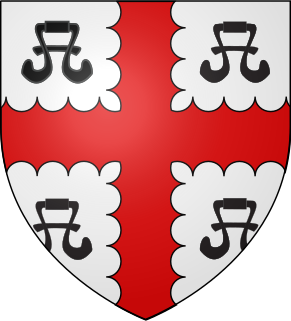
Sir Julius Caesar was an English lawyer, judge and politician who sat in the House of Commons at various times between 1589 and 1622. He was also known as Julius Adelmare.
Sir John de Benstede KB (c.1275 –1323/4) was a prominent member of the English royal household in the late 13th and early 14th century. He was Prebendary of Sandiacre from 3 February 1297 until, presumably, 1308, when he married. He was also King's Secretary, and he served variously as keeper of the Great Seal and controller of the wardrobe. He also served as Chancellor of the Exchequer from 1305 to 1306, and as a royal judge from 1309 onwards.
Oxford was a parliamentary constituency in the United Kingdom. It comprised the city of Oxford in the county of Oxfordshire, and elected two members of parliament from its creation in 1295 until 1885 when its representation was reduced to one member by the Redistribution of Seats Act 1885.
Morpeth was a borough constituency centred on the town of Morpeth in Northumberland represented in the House of Commons of the Parliament of England until 1707, the Parliament of Great Britain from 1707 to 1800, and then the Parliament of the United Kingdom.

Sir John Pratt (1657–1725) was an English judge and politician. He was Lord Chief Justice of England from 15 May 1718 until 2 March 1725. He was appointed as an interim Chancellor of the Exchequer on 2 February 1721 until 3 April 1721.
Hervey de Stanton was an English judge and Chancellor of the Exchequer.
Cricklade was a parliamentary constituency named after the town of Cricklade in Wiltshire.
Wilton was the name of a parliamentary borough in Wiltshire. It was represented in the House of Commons of the Parliament of England from 1295 to 1707, then in the Parliament of Great Britain from 1707 to 1800 and finally in the House of Commons of the United Kingdom of the Parliament of the United Kingdom from 1801 to 1918. It had two Members of Parliament (MPs) until 1832, but from 1832 to 1885 only one member, as a result of the Reform Act 1832. In 1885 the borough was abolished, but the name of the constituency was then transferred to a new county constituency electing one Member from 1885 until 1918.

Nottingham was a parliamentary borough in Nottinghamshire, which elected two Members of Parliament (MPs) to the House of Commons from 1295. In 1885 the constituency was abolished and the city of Nottingham divided into three single-member constituencies.

John Droxford, was a Bishop of Bath and Wells. He was elected 5 February 1309 and consecrated 9 November 1309.
John Bond LL.D. (1612–1676) was an English jurist, Puritan clergyman, member of the Westminster Assembly, and Master of Trinity Hall, Cambridge.
The Lord President of Connaught was a military leader with wide-ranging powers, reaching into the civil sphere, in the English government of Connaught in Ireland, in the sixteenth and seventeenth centuries. The office was created in 1569, and in 1604 was reconstituted with full powers to hear all civil suits, to impose martial law and to proceed with "fire and sword" against the King's enemies. The width of his powers gave rise to clashes with the longer established courts: in 1622 he and the Lord President of Munster were ordered not to "intermeddle' in cases which were properly within the remit of those courts. He was assisted by a council whose members included the Chief Justice of Connacht, one or two associate justices and the Attorney General for the Province of Connacht. The office was abolished in 1672.
Robert Sadington was Lord Chancellor of England.

John Fowke was an English merchant and politician. He served as a Sheriff of London for 1644 and Lord Mayor of London for 1652.

John de Bourchier was an English Judge of the Common Pleas and the earliest ancestor, about whose life substantial details are known, of the noble and prolific Bourchier family, which in its various branches later held the titles Barons Bourchier, Counts of Eu, Viscounts Bourchier, Earls of Essex, Barons Berners, Barons FitzWarin and Earls of Bath.
Robert de Cliderhou, was a Chancery clerk and pastor who was allegedly involved in the rebellion against Edward II by Thomas, Earl of Lancaster.
Thomas Barowe or Barrow was an English ecclesiastic and judge.
Thomas de Baumburgh was an English official, clerk of the chancery and keeper of the great seal. He is mentioned in 1328 as then holding the living of Emildon in Northumberland, to which he had been presented by the king.
Robert Tracy (1655–1735) was an English judge.

John Scott-Waring (1747–1819) was an English political agent of Warren Hastings, publicist and Member of Parliament.






